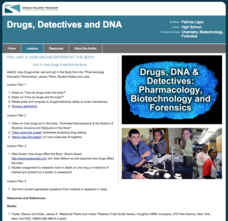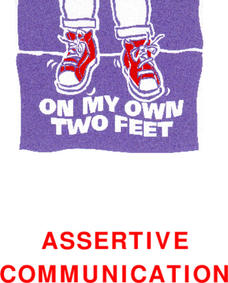National Education Association
Rx for Understanding: Preventing Prescription Drug Abuse
Did you know more than 2,000 teens begin abusing prescription drugs each day? Ensure your learners are educated about the crucial health issue of prescription drug abuse with this unit.
Foundation for a Drug-Free World
The Truth About Drugs
Teenagers hear many messages about drugs from advertisements, their peers, their teachers, and their parents. But who is lying? What is the truth? A thorough, thoughtful unit takes a purposeful look at drug education, drug culture, and...
Nemours KidsHealth
Drugs: Grades 6-8
What happens to your body when you use drugs? What do you do if your friend wants you to start using? Learn about the signs of addiction and the ways to withstand peer pressure with two classroom activities. After storyboarding the...
US National Library of Medicine
Drug Use and Abuse: Past and Present
Pick your poison: tobacco, alcohol, opiates, cocaine, or marijuana. An online exhibition launches a research project that asks groups to select one of the five drugs and gather information on how the use of the drug and the regulations...
Kenan Fellows
Unit 3: How Drugs Enter/Exit the Body
The third of a four-part series on Pharmacology teaches scholars how drugs enter and exit the body, how they act inside the body, how they affect the brain, and more. Over the course of the unit, groups complete two labs and one...
PBS
Stories of Painkiller Addiction: Decisions and Consequences
Teach young learners that most drug addictions end in one of three outcomes: treatment, jail, or death. After watching a short video segment on the consequences of drug abuse, class members discuss what they viewed and consider what...
Florida Department of Health
Understanding the Risk of Substance Abuse Unit
Teenage brains are different! Understanding that the teenage brain is still developing and thus more impacted by substance abuse is the key concept in a three-lesson high school health unit. Participants learn about how the brain and...
Council for the Curriculum, Examinations and Assessment
Drugs Awareness
The final lesson in a series of 10 focusing on Social, Physical, Emotional, Cognitive and Spiritual (SPECS) health investigates the effects of legal and illegal substances, their risks, and the consequences of their misuse.
Nemours KidsHealth
Drugs: Grades 3-5
Two lessons take a close look at drug prevention. The first lesson, split into two sessions, challenges learners to gather information from an article, answer questions, then create a poster that encourages others to stay away from...
Council for the Curriculum, Examinations and Assessment
Drugs Awareness
Peer pressure can lead to dangerous activities for the eighth graders in your class. Prepare them for the tough conversations in the years ahead with a set of lessons about drugs and their consequences on users' lives.
National Association of School Nurses
Learn to Be Smart and Safe with Medicine
The stated purpose of a school tool kit is to help schools implement teen prescription drug abuse awareness programs. The kit includes actions that groups can take in the school, with parents, and in the community at large.
Generation Rx
My Generation Rx: Plot Twists
How can prescription drugs be dangerous if they were prescribed by a doctor? Is it okay to share your prescription drugs with friends if they really need them? Clear up any common misconceptions about prescription drugs with a set of...
Department of Education (Ireland)
Consequences
11 lessons, designed to be used in consecutive order, ask middle and high school scholars to consider the effects of various drugs and the consequences of taking them for themselves and their families. They also develop the communication...
PBS
Stories of Painkiller Addiction: Contemplating Nature vs. Nurture
Does having an addict in your family make it more likely to become one yourself? Explore the genetic risk factors, as well as the prominent environmental influences, for substance addiction in a lesson that encourages awareness and open...
PBS
Stories of Painkiller Addiction: The Brain on Autopilot
For some people, the force of addiction can be as biologically compelling as the drive for food or water. High schoolers watch a video segment about Ryan, a recovering addict, and learn more about how opioids and other drugs can affect...
Carfleo
Substance Use and Abuse
What is substance abuse? What is the difference between a depressant and a stimulant? Here is a comprehensive unit on drug use, including three lessons with such activities as categorizing and defining key terms, identifying issues...
PBS
Stories of Painkiller Addiction: Commitment to Recovery
Recovery from substance addiction is an ongoing process. The final lesson in a series about painkiller abuse and addiction prompts learners to research various recovery options before writing a short story about a character who is going...
RAND Corporation
Project ALERT
Why do people use drugs? What are the consequences? The alternatives? How can young people resist the pressures to use drugs? The Project Alert drug prevention program provides middle schoolers with the information they need and the...
Kenan Fellows
Unit 4: The Brain
Drugs interact with the brain to alter moods, emotions, and behaviors by changing the brain's chemistry, perceptions, and interactions. The final lesson in the Pharmacology unit shows scholars experiments, has them complete four labs,...
Discovery Education
Is Our Community Influenced by the Opioid Epidemic?
Opioid abuse is becoming a national crisis, but combating the influence of opioids requires examining the ways it affects individual communities. A thorough teacher guide provides step-by-step instructions about implementing an...
Discovery Education
Our Brain and Body on Opioids
Use a presentation that explores the world of prescription opioids. Learners look at the way the brain responds to the drugs and the long terms effects opioids have on the brain and body. At the end of the lesson plan, groups create a...
PBS
Opioids in Our Community—Middle School
How do opioids affect the lives of families and individuals within a community? Scholars explore the topic with a series of informative, thought-provoking videos. They also complete worksheets and discuss the effects of the opioid...
Department of Education (Ireland)
Assertive Communication
Assertive communication is an acquired skill. Teaching young people to ask for what they need and to believe that they have a right to ask is at the core of a unit on assertive communication. Over the course of the unit, middle and high...
Health Smart Virginia
Surviving High School Awareness Campaign
To demonstrate what they have learned in the Health Smart unit, sophomores design a resource for incoming ninth-graders that includes what they consider the most important information they gleaned from one of the eight topics studied.
Other popular searches
- Drug Abuse Posters
- Drug Abuse Lesson Plans
- Alcohol and Drug Abuse
- Drug Abuse Prevention
- Prescription Drug Abuse
- Effects of Drug Abuse
- Drug Abuse Play
- Drug Abuse Projects
- Drug Abuse Survey
- Drug Abuse and Prevention
- Drug Abuse Factors
- World Drug Abuse

























